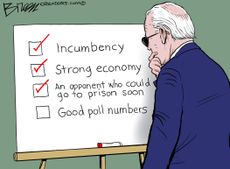The Premier League's spending cap: levelling the playing field?
Top clubs oppose plan to link spending to income of lowest-earning club, but rule could prevent success gap from widening

A football season marked by off-field controversies may conclude with one of the Premier League's "better boardroom decisions".
On Monday, 16 of the 20 top-tier English clubs backed a proposal for a new "anchoring" system, said Miguel Delaney, chief football writer at The Independent. This is essentially a spending cap, limiting the amount a club could invest to a multiple (likely to be about 4.5 to 5) of what the lowest-earning club receives from centralised broadcasting deals. It would prevent the wealthiest clubs from accumulating more revenue to allow them to spend more, "as has been the case for most of the last 40 years".
Manchester United, Manchester City and Aston Villa voted against the proposal, and Chelsea abstained, but only 14 votes in favour were needed for it to pass. The proposal will now be put to the clubs at the annual general meeting in June for a vote, and introduced for the 2025-26 season.
Subscribe to The Week
Escape your echo chamber. Get the facts behind the news, plus analysis from multiple perspectives.

Sign up for The Week's Free Newsletters
From our morning news briefing to a weekly Good News Newsletter, get the best of The Week delivered directly to your inbox.
From our morning news briefing to a weekly Good News Newsletter, get the best of The Week delivered directly to your inbox.
'Punish them for their success'
This is a "significant step" towards a hard salary cap, said the Financial Times sports editor Josh Noble. It's part of a broader push across European football to halt the "spiralling wage and transfer costs" that have led to "years of losses" for clubs. The financial restraint is being driven by more professional investors and weakening broadcaster demand for live TV rights.
The Premier League is the richest domestic competition in the world, and boasts six of 10 highest-income clubs in Europe, but they have "largely failed to translate increased revenue into profits". Last season, only three out of the 20 Premier League clubs recorded an annual profit. The competition is exploring new measures to end "the cycle of overspending".
But some executives fear linking spending to income will effectively "lock in the financial advantages of the biggest clubs", said Noble, and harm the competitiveness of the Premier League. Players' unions have warned that salary caps could go against European competition law.
The Professional Footballers' Association said it would "wait to see further details" of the proposals. But the union would "oppose any measure that would place a 'hard' cap on player wages".
Manchester United believe the proposal would "slow down" attempts to improve playing fortunes at Old Trafford, which will "cost a lot of money", said The Athletic. Limiting spending would undermine the club's ability to compete at the highest level in European tournaments, and "punish them for their success" in generating such significant revenues year after year.
'A more equitable rule'
It's "no surprise" that Manchester City are opposing the spending cap, said Ian Herbert in the Daily Mail. City are owned by Sheikh Mansour – a member of Abu Dhabi's royal family and the current vice-president and deputy prime minister of the United Arab Emirates. When a Gulf state owns a club, state-owned companies suddenly become interested in "paying top dollar" to sponsor that club. Gulf sovereign wealth funds are "shredding" any notion of financial parity in the competition.
City also have "myriad" other ways of bringing in extra cash, like selling players' image rights to companies they have a financial interest in or "intellectual property" to other clubs they own, or similar "acts of accounting gymnastics".
The club is facing 115 charges of breaching financial sustainability rules (which it denies). A new system of spending controls, rooted in the "mundane, transparently calculable figure of the lowest club's income", would be a "profound relief" to those living in the real world, said Herbert.
This is a "more equitable rule", said Delaney in The Independent, one that would "encourage sustainability" and help suppress the "maddening" wage race that has led to punishment for overspending and ticket price increases.
Something that is "often overlooked", he said, is that football's product isn't stars or super-squads, but competitive games. They drive interest because they create "drama", which creates a narrative. And competition balance doesn't happen organically; it requires "heavy regulation" to prevent wealthier clubs from "sailing away". That's why this proposal is being described as "future-proofing". It won't be perfect, but it is "the right step".
Create an account with the same email registered to your subscription to unlock access.
Sign up for Today's Best Articles in your inbox
A free daily email with the biggest news stories of the day – and the best features from TheWeek.com
Harriet Marsden is a writer for The Week, mostly covering UK and global news and politics. Before joining the site, she was a freelance journalist for seven years, specialising in social affairs, gender equality and culture. She worked for The Guardian, The Times and The Independent, and regularly contributed articles to The Sunday Times, The Telegraph, The New Statesman, Tortoise Media and Metro, as well as appearing on BBC Radio London, Times Radio and “Woman’s Hour”. She has a master’s in international journalism from City University, London, and was awarded the "journalist-at-large" fellowship by the Local Trust charity in 2021.
-
 5 high rating cartoons about Biden's low poll numbers
5 high rating cartoons about Biden's low poll numbersCartoons Artists take on checklists, ice creams, and more
By The Week US Published
-
 A gastronomic tour of the Costa de la Luz
A gastronomic tour of the Costa de la LuzThe Week Recommends This Spanish spot has fantastic restaurants "rooted in the region's distinctive produce"
By The Week UK Published
-
 Crossword: May 19, 2024
Crossword: May 19, 2024The Week's daily crossword
By The Week Staff Published
-
 The England kit: a furore over the flag
The England kit: a furore over the flagWhy everyone's talking about Nike's redesign of the St George's Cross on the collar of the English national team's shirt has caused controversy
By The Week UK Published
-
 Is a new English football regulator an own goal for the game?
Is a new English football regulator an own goal for the game?Talking Point PM hails 'historic moment for football fans' but West Ham owner warns it could 'ruin' Premier League
By The Week UK Published
-
 English football and the etiquette of leaving the stadium early
English football and the etiquette of leaving the stadium earlyTalking Point The belief that 'true fans stay to the end' does not always apply
By The Week UK Published
-
 The NFL's concussion settlement has seemingly failed its players
The NFL's concussion settlement has seemingly failed its playersUnder the Radar The league promised to pay players who had suffered brain trauma. Allegedly, it has not happened.
By Justin Klawans, The Week US Published
-
 WSL takeover: a new era for women's football?
WSL takeover: a new era for women's football?Under the radar Split from governing body comes in wake of record crowds, TV audiences and revenue in the women's game
By Harriet Marsden, The Week UK Published
-
 The European Super League: a 90th-minute reprieve?
The European Super League: a 90th-minute reprieve?Why everyone's talking about A European court ruling has potentially breathed new life into the breakaway football league
By Richard Windsor, The Week UK Published
-
 College football has a major controversy. Will Congress get involved?
College football has a major controversy. Will Congress get involved?Talking Point Why Florida State was left out of the College Football Playoff
By Joel Mathis, The Week US Published
-
 Saudi Arabia's 2034 World Cup: glitz, glamour and 'grimly inevitable'
Saudi Arabia's 2034 World Cup: glitz, glamour and 'grimly inevitable'Talking Point Critics claim country is guilty of sportswashing as it stands unopposed to host tournament
By Julia O'Driscoll, The Week UK Published